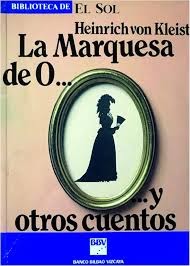
Idioma original: German
Original title: The Marquise of O…
Translation: Carmen Bravo Villasante
Year of publication: 1807-1810
Valuation: Recommended
To be honest, the assessment could also be Intensefor example, because that is how everything is in our friend Heinrich von Kleist, both in his (short) life and in his work. In the first aspect, one could say that he embodied in all its dimensions the concept of romanticism, of which he was one of its most outstanding representatives. Heinrich had that gene that makes one feel destined to write the definitive book, to reach the absolute, to reach the ultimate limit in everything that has to do with emotions, to live life in all its intensity without any calculation, and to die in the way that occurs to all of us when we speak of such a character. The failure of his works and the contempt of his contemporaries are other elements that are inevitable in his career as a tormented and obsessive author, so that only many years after his death did the value of his work begin to be appreciated. In short, it can perfectly be said that his own life would have been his best novel.
It is not surprising, however, that his prose did not please the public and critics alike. Kleist writes in a somewhat torrential manner, with a strange use of punctuation and a visible imbalance in rhythm, which lingers for a long time until the action comes to a standstill and suddenly accelerates to accumulate facts that sometimes appear fleeting or end up absorbed by an ellipsis. And yet it is not without its grace, as sometimes happens with this type of non-academic writer, with a so-called free style, whose way of writing seems to transmit without filters all the impulse that fills his head and heart. It will not be exactly a pleasant read, but it does leave a pleasant sensation of freshness and sincerity. Of course, two hundred years ago these virtues were probably not appreciated in the same way.
The content of the stories also explains why they were not appreciated in their time. That intensity that was pointed out as a hallmark is fully present in the narrative, especially in The Marchioness of O…which must have shocked the right-thinking minds of the time. The Marquise, a widow of good social standing, is pregnant, and actively and passively defends that she has not had any relationship that could be established as the origin of such a state. Although the situation is not explained, the Marquise is not stupid either and, in order to restore her honor as far as possible, she announces in the newspaper, in a naive and rather surprising way, that she will marry the man who claims to be the father. Of course, she receives radical repudiation from her own family, especially from the severe father, and there appears a certain lost Russian count full of intentions and somewhat mysteriously in love with the Marquise. A strange drama in which there is no lack of some inexplicable reactions from the characters, a shocking element although of a certain attraction that also abounds in the rest of the stories.
Love, always subject to complex vicissitudes, is also the core of two other stories, surprisingly set in rather exotic settings for the time: the Chilean earthquake (I imagine the Valparaiso earthquake of 1730) and the Haitian revolution of the late 18th century. Deep and passionate loves are subjected to extreme conditions, mixed with tragedies and social upheavals, and are unlikely to end happily. Evil always seems to triumph: crimes and unjust accusations prevail over the solidarity feelings of Chileans in the face of tragedy, and hatred and ferocious violence overshadow the pure intentions of the lovers in the brutal setting of the black revolt in the French colony. This story, innocently titled The marriage of Saint Dominicalthough it does not have the subtlety of The Marchioness of O…it seems to me the best constructed from the narrative point of view, with a well-developed progression, ingredients of terror and suspense, and entanglements and misunderstandings of a romantic novel.
It seems less relevant to me The beggar of Locarno which closes the book, a short story with an air of mystery that brings to mind the initial episode that triggers Beauty and the beast (Disney version), leaving the question of whether Kleist could have been his inspiration, or whether he in turn picked up the influence of older stories.
In any case, a small book that can be read in a flash, with a very interesting prologue and very appropriate for getting to know German literary romanticism in the flesh.
Source: https://unlibroaldia.blogspot.com/2024/09/heinrich-von-kleist-la-marquesa-de-o-y.html


